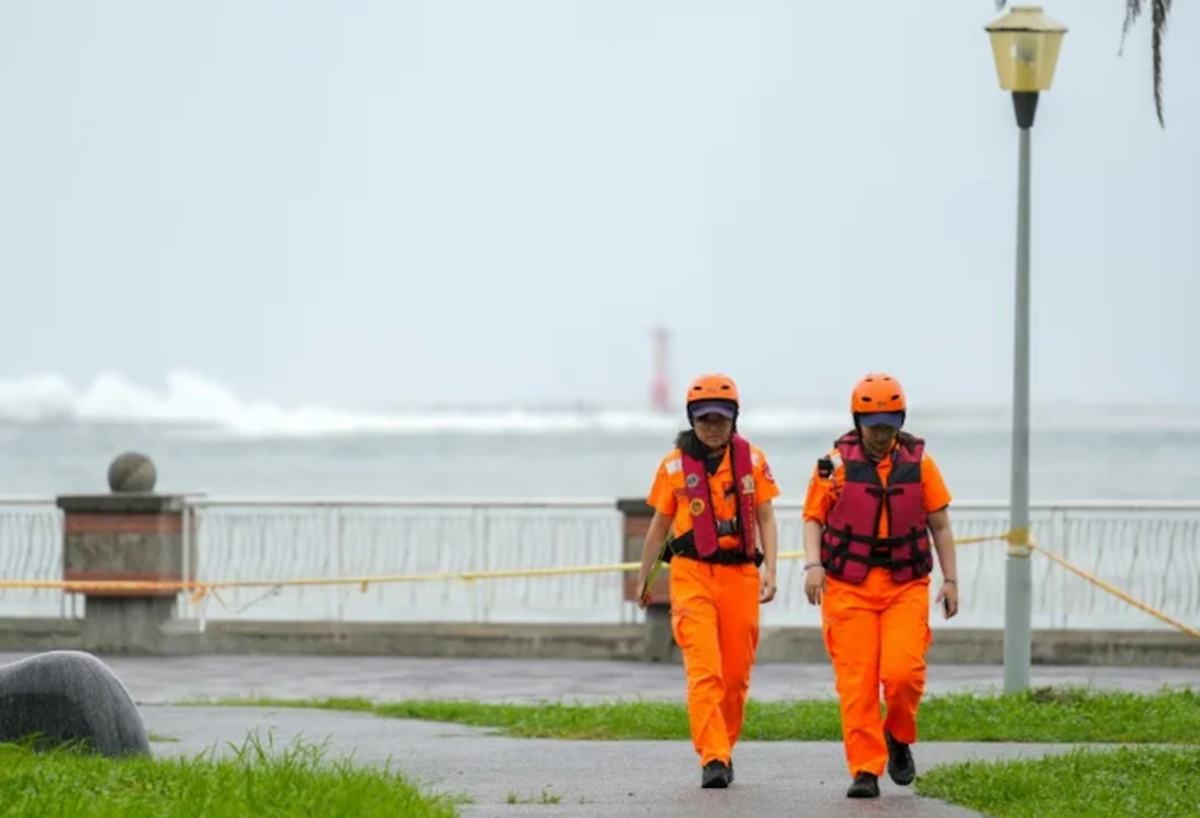Agence France-Presse
October 1, 2024

Waves break off Sizihwan Bay beauty spot in Kaohsiung as coast guard officers patrol ahead of the arrival of Super Typhoon Krathon (WALID BERRAZEG/AFP)
Taiwan closed schools and evacuated thousands of people in the south of the island Tuesday ahead of the arrival of Super Typhoon Krathon, with the president warning it was likely to cause "catastrophic damage".
Krathon -- packing sustained winds of 198 kilometers per hour (123 miles per hour), equivalent to a Category 3 hurricane, and gusts of up to 245 kph -- was expected to make landfall Wednesday near the major port city of Kaohsiung.
Offices and schools were closed across southern and eastern Taiwan and the interior ministry said more than 7,800 people had been evacuated from vulnerable areas as a precaution.
President Lai Ching-te warned Krathon would "inevitably cause catastrophic damage".
"The path of Krathon is relatively rare, entering from the south and exiting from the east. Therefore we must be particularly vigilant," he said at a government briefing.
Dozens of international and domestic flights have been cancelled.
Nearly 40,000 troops were on standby for relief missions, the defense ministry said.
In southern Renwu district, part of Kaohsiung, soldiers were seen filling sandbags for distribution to the public, with a few dozen residents waiting at the district office to receive theirs.
Wu Mao-shu, a supervisor at the office, said "people are eager to collect sandbags to protect their homes. Up until yesterday we gave away around 7,400 and another 1,100 today so far."
Wu said authorities had also cleared the storm drains in the area to avoid a repeat of the widespread flooding seen during typhoon Gaemi in July.
Gaemi was the strongest typhoon to make landfall in Taiwan in eight years, leaving at least 10 people dead and hundreds wounded.
Taiwan is accustomed to frequent tropical storms from July to October but experts say climate change has increased their intensity, leading to heavy rains, flash floods and strong gusts.
- 'Can't underestimate' Krathon -
In Kaohsiung, residents taped up windows, filled sandbags and erected barriers around their homes to keep out floodwaters.
Coast guard officers patrolling the nearby scenic tourist spot of Sizihwan Bay told people to stay away as powerful waves pounded the coast.
Retiree Ou Rui-yao, who was birdwatching in the area, said he had prepared his home for the storm.
"We need to be very careful as this typhoon must be very strong," said Ou, 82. "Since the tide is high, we have put up water barriers."
"For the whole of Taiwan, we can't underestimate this typhoon."
Taiwan's TSMC, the world's largest chipmaker, said it had "activated routine typhoon alert preparation procedures" at all fabrication plants and construction sites on the island.
"We do not expect significant impact to our operations," it said in a statement.
- Philippine islands hit -
The typhoon was around 220 kilometers south-southwest of Kaohsiung at 1:00 pm (0500 GMT), the Central Weather Administration said.
The storm was approaching Taiwan after pounding a remote group of Philippine islands, where it cut power and communications and damaged "many" houses, according to the local mayor.
The Philippines' National Disaster Risk Reduction and Management Council said Tuesday that nearly 1,800 people had been evacuated, around half in the Batanes islands near southern Taiwan.
Taiwan's coast guard said a Barbadian ship, the Blue Lagoon, was taking on water and tilting off the southeast city of Taitung due to the storm, with national rescue authorities later saying its 19 crew members had been airlifted to safety.
Across Taiwan, 23 typhoon-related minor injuries had been reported as of Tuesday afternoon, authorities said without providing details.
In Taitung, where the typhoon has brought heavy rains and waves of up to seven meters (23 feet), a man was sent to hospital after his truck was hit by a huge falling rock as he was driving along a mountainous route, local media said.
Typhoons are common around the region at this time of year.
However, a recent study showed that they are increasingly forming closer to coastlines, intensifying more rapidly and lasting longer over land due to climate change.
No comments:
Post a Comment